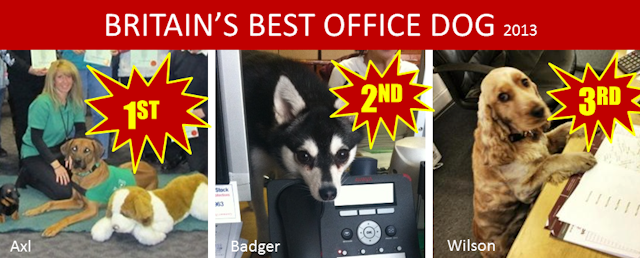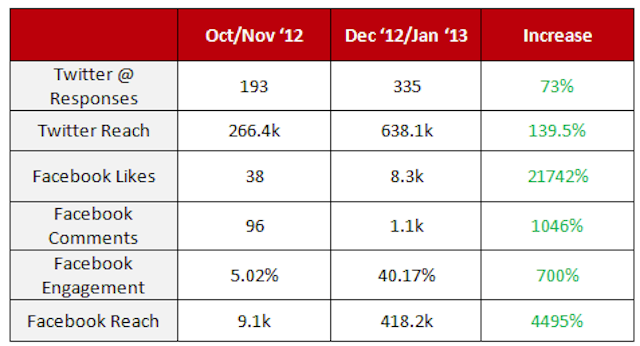The story of how one company utilised social media to demonstrate that even irrelevant content can become an advantage with the correct strategy
A social networking campaign to crown Britain's best office dog provided the perfect platform for social media and content marketing company Red Rocket Media to demonstrate how even seemingly irrelevant content can be used to raise brand awareness.The canine competition was run over a two month period between December 2012 and January 2013 using the company's Facebook and Twitter pages to promote and gather votes. The Facebook reach increased by a massive 4,495 per cent over the course of two months, with Twitter increasing by 139.5 per cent. The company aimed to demonstrate it's business line of how effective social media alone could be in achieving results. It would also show how the right idea could motivate users to repeatedly share the content without being prompted, thus promoting both the Red Rocket Media brand and the profile of the businesses which entered.
HOW THEY DID IT
Marketing manager at
Red Rocket Media, Michelle Hill, said: "As dog lovers ourselves - we have an office dog called Ozzie who was the inspiration behind the competition - we know how passionate people are about their pooches. We hoped that their passion would fuel the campaign and it certainly did just that. The results were really quite overwhelming, yielding previously unseen levels of social media engagement and brand reach.”Businesses were invited throughout December to submit their entries to the competition - a photograph of their office dog along with a paragraph explaining why the dog should win - which were then uploaded to the Red Rocket Media website. Voting for each dog had to be done through clicking either the Facebook or Twitter vote button, and dogs would be featured regularly on both social media sites throughout the competition. Public voting opened on 7 January and closed almost two weeks later.The Facebook vote button redirected voters to the company's Facebook page to case their vote by liking the dog's picture, while the tweet option generated an auto tweet with the name of the dog, the competition hashtag and the Red Rocket Media Twitter handle, along with a request to retweet to encourage other voters to get involved.The interest generated from social media use then attracted press attention. The competition was featured on TV radio, print and online blogs as a result of what the company called "dog-owner-driven promotion".
THE RESULT
Visits to the company's website more than doubled during the campaign, and of the 1,200 Twitter votes, around 400 came from website users with the rest coming from retweets. Facebook's insight feature showed likes on the Facebook page increased over 2,000 per cent, from just 38 in October/November 2012 to 8,300 by January 2013. The number of comments posted on the page rose from 96 to over a thousand, and the entire Facebook reach jumped from 9,100 to 418,200. The competition received almost 6,500 Facebook votes, bringing the total to around 7,700 overall.The competition concept was chosen partly to allow the company to show how irrelevant content could not only increase overall brand awareness, but target high level decision makers in the process. Working on the basis that most office dogs would be owned by the managing director, the company successfully delivered the objective when 87% of entries submitted came from either senior managers or company directors.The competition's sponsor, Muddy Paws, benefited from a 239 per cent increase in revenue from direct traffic transactions, while traffic itself increased by over 8,000 visits during January. Revenue from SEO and PPC increased by 53 per cent and daily traffic peaked at over 5,000 visits on the day voting closed.Red Rocket Media also reported that quality, not just quantity, added extra value to the campaign after it gained exposure from high profile brands such as Google, Dogs Trust, London Irish RFC, Sega, Hobbycraft and White Stuff.
“As content marketing specialists, we know that commercially-neutral content is the most shared form of content on social media," Hill added. "People generally don’t want to read about how great your company is or the latest award you’ve won so the chances of them sharing it is pretty slim. If you want people to share your content on social media, then it needs to connect with them at a much deeper level; they need to be genuinely interested in it. "Whilst this might be industry news, how-to guides or infographics, we wanted to prove that even seemingly irrelevant content can also be really effective at driving tangible results to a business."The success of the campaign led to one company signing up to Red Rocket Media's social media management package within five days of the competition ending while discussions with three other business opened up as a result. The idea proved, with notable results, that concepts irrelevant to the business of a company could be a valuable method in increasing brand awareness and capturing the attention of target customers and clients at a higher boardroom level.



